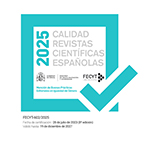Fact-checking colaborativo: análisis de seis iniciativas contra la desinformación en campaña electoral en Europa y América Latina
Resumen
La colaboración entre redacciones en proyectos de investigación periodística o de verificación de datos ha cobrado fuerza en los últimos años. Periodistas de todo el mundo han sumado esfuerzos para combatir la desinformación, especialmente en campañas electorales. Este artículo analiza seis proyectos colaborativos de monitoreo en procesos electorales en Europa (Francia, España y Unión Europea) y América Latina (Brasil, México y Uruguay), que muestran la preocupación de periodistas e instituciones de la sociedad civil por combatir la desinformación. A partir de una metodología cuantitativa y cualitativa, el estudio da respuesta a cuatro cuestiones: la composición de las redes de colaboración, metodologías y modelos de verificación; el volumen de trabajo y contenidos publicados; los protagonistas de las verificaciones y la atención a las declaraciones de candidatos y políticos; y los resultados de las verificaciones y diferencia en función de los protagonistas y consorcios analizados en cada región. Los resultados evidencian el peso de la desinformación en campaña: cuatro de cada cinco verificaciones detectaron contenido falso o engañoso. También revelan la identificación de un porcentaje global de contenidos desinformativos mayor en Europa (86,3 %) que en Latinoamérica (75,5 %). Las conclusiones sugieren que existen diferencias entre los consorcios que trascienden las regiones y apuntan a la influencia en el fact-checking de las culturas profesionales de cada país. Asimismo, la comparación entre proyectos colaborativos evidencia la diversidad de modelos, metodologías y formatos, lo que suscita la importancia de estudios comparativos para evaluar el tipo de colaboración implementada y la viabilidad..
Descargas
Descarga artículo
Licencia
La revista Estudios sobre el Mensaje Periodístico, para fomentar el intercambio global del conocimiento, facilita el acceso sin restricciones a sus contenidos desde el momento de su publicación en la presente edición electrónica, y por eso es una revista de acceso abierto. Los originales publicados en esta revista son propiedad de la Universidad Complutense de Madrid y es obligatorio citar su procedencia en cualquier reproducción total o parcial. Todos los contenidos se distribuyen bajo una licencia de uso y distribución Creative Commons Reconocimiento 4.0 (CC BY 4.0). Esta circunstancia ha de hacerse constar expresamente de esta forma cuando sea necesario. Puede consultar la versión informativa y el texto legal de la licencia.










